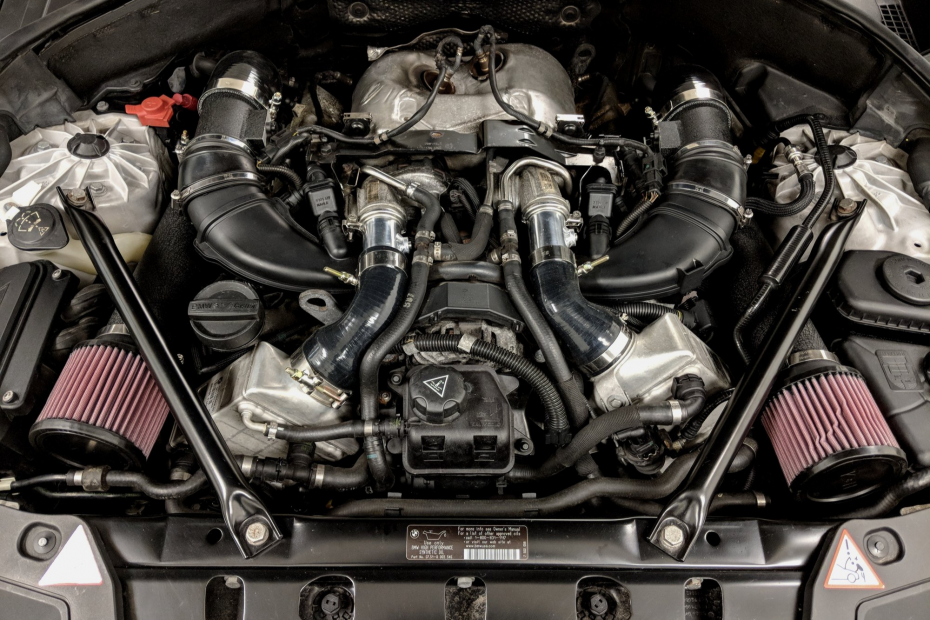BMW N63tu Stock Twin Turbos Max Boost
What is the max boost the stock N63tu twin turbos can handle? How much PSI can the N63tu twin turbos handle without completely killing longevity? We see the questions asked often, and they’re valid questions. However, there is not always a perfect answer. Regardless, we will lay it out as clearly and straight-forward as possible. In this guide, we’ll discuss the limits of the N63tu stock turbos along with some external factors.
For more information about the BMW N63 engine including engine specs, common problems, and popular modifications, take a look at our dedicated BMW N63 Engine Page.

BMW N63tu Stock Turbo Max Boost/PSI
Prior to discussing the numbers we want to throw in a few considerations. If you’re concerned with longevity then it’s best to avoid completely maxing the stock N63tu turbos. Almost all turbos will make more PSI than they were designed to make. However, that doesn’t mean they’re doing so efficiently. PSI isn’t everything. The volume of air the turbos are flowing is also important. Pushing beyond that limit generally results in diminishing gains.
Additionally, the small stock turbos are capable of producing a lot of torque, especially in the lower-end and mid-range. The N63tu is a strong engine, however completely maxing the stock turbos may very well push the N63 near its limits. Nonetheless, the max boost on N63tu stock turbos is as follows:
- ~25+ PSI max boost
- ~20 PSI “safe” limit
The stock N63tu turbos are capable of producing upwards of or beyond 25psi. However, that kind of boost is undoubtedly pushing these turbos outside of their efficiency range. We believe roughly 20psi is a good mark for a balance of performance and longevity. Those willing to accept the additional risk may consider pushing up to 22-23psi. However, 23+psi should definitely be reserved for those planning to upgrade the N63 turbos anyways.
N63tu Turbo Longevity at 20+PSI
This is not only a tough conversation for all engine parts, but also for the N63tu’s turbochargers. Some completely stock, well maintained engines give out before 100,000 miles. On the other hand, some 600+whp engines may last for hundreds of thousands of miles. The same can be said for the N63tu turbos. However, there are a few general rules.
First – all else equal – more boost is going to put more stress on the turbos. Now, there’s a reason we said all else equal. One N63tu may be running 23psi, but the boost is rarely used. Another running 18psi that is aggressively driven and tracked is probably going to put more stress on the turbos. There are of course other factors like maintenance, outliers, luck of the draw, etc. However, the general rule applies. The more boost you run and the more you use that boost the more stress you’re putting on the turbos.
That said, we believe under 20psi is a reasonable limit where longevity generally won’t suffer significantly. Yes, there is still risk. That’s the case with basically any modification that improves performance.
N63tu Stock Turbos at Higher Elevation
As most know – air gets thinner as elevation increases. Therefore, the stock N63tu turbos have to work harder to compress the thinner air. For example, 20psi is generally tougher on turbos at 5,000 feet elevation as compared to sea level. We recommend backing out a couple PSI, depending upon your elevation. It’s an unfortunate reality for those of us who live at higher elevations.
We’ve had experiences with blown turbos (twice) on our N54 at ~5,400 feet elevation. It may have been bad luck or maybe there were other factors at play. Nonetheless, we hadn’t heard of many other N54 turbos letting go so quickly at 18.5-19psi. Fortunately, there are some other ways to make up the power lost from cutting out a few PSI. Higher elevations often have cooler air temperatures. This may allow you to run slightly more aggressive ignition timing.
Additionally, there are other ways to make the power if you’re dying for more. Opt for upgraded turbos, run better fueling, or get some more supporting mods. You may be willing to risk the stock turbos if you don’t mind shelling out the money to upgrade. Otherwise, play it safe and cut back a couple PSI.
N63tu Stock Turbos Max Boost Summary
The N63tu is an impressive engine with capable twin turbochargers. They will generally hold upwards of or beyond 25psi. However, that is pushing the stock turbos outside their efficiency range. We recommend ~20psi for a respectable balance of performance and longevity. There is of course still risk. Though, we believe 20psi with proper tuning and supporting mods is sustainable for the long-run.
One further consideration – N63tu’s run at higher elevation may consider backing out a few PSI. Play it safe and look to better fueling, tuning, or supporting mods to make up some of the power.
Check out our post about how to build a 500+whp N63
Or feel free to drop a comment and share your experiences with the N63tu engine











